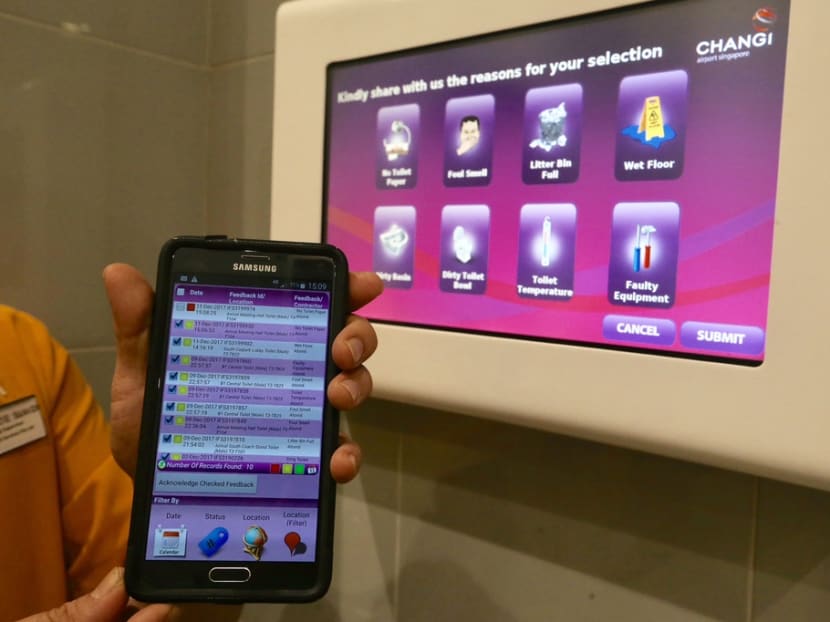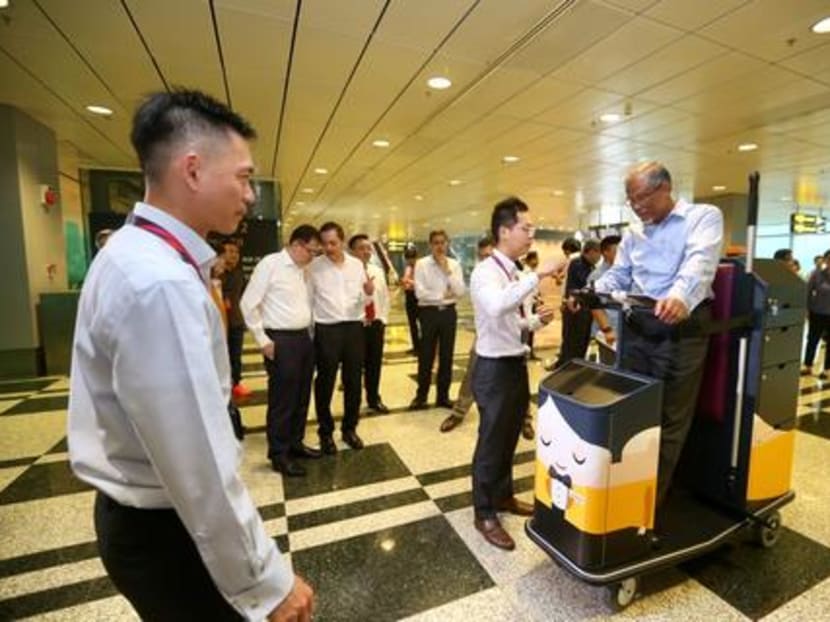Robotics, powered wearables set to improve cleaners’ jobs
SINGAPORE — To minimise the stench in toilets, floor tiles with coatings that can neutralise odours are being tested in the toilets at City Square Mall. Over at Changi General Hospital, senior workers could also put on exoskeletons – powered brace-like wearables – to reduce the strain of cleaning and waste management operations.

Toilet feedback system seen during the Technology Demonstration Site Visit at Changi Airport Terminal 3, taken before the launch of the Environmental Services Industry Transformation Map (ES ITM) on Monday (Dec 11). Photo: Koh Mui Fong/TODAY
SINGAPORE — To minimise the stench in toilets, floor tiles with coatings that can neutralise odours are being tested in the toilets at City Square Mall.
Over at Changi General Hospital, senior workers could also put on exoskeletons – powered brace-like wearables – to reduce the strain of cleaning and waste management operations.
These are part of a series of trials to be conducted by the National Environment Agency (NEA) and seven partners over the next few years to find better technologies and solutions for the environmental services industry.
Letters of Intent were signed with the seven partners under the Innovating and Curating Better Automation and Technologies for Environmental Services (Incubate) initiative during the launch of the Environmental Services Industry Transformation Map on Monday (Dec 11).
Given the manpower constraints in Singapore, it would not be sustainable to increase manpower in the sector to meet the growing demand for environmental services, said NEA in a media release.
“Transforming the industry is thus necessary to improve productivity, promote growth and create better jobs for these sectors,” said a spokesperson.
Thirty-three initiatives across 12 strategies were spelled out in the transformation map, which aims to drive innovation and wider adoption of technology in the sector, improve the skills of the workforce, raise productivity levels and capture value from overseas markets.
By 2025, NEA expects about 30,000 people in the sector to benefit from higher value-added jobs after upgrading their skills and when companies adopt new technologies. There are now more than 78,000 professionals and 1,700 companies in the cleaning and waste management sectors.
As part of Incubate, the partners and NEA will identify challenges, conduct trials for new technology and solutions to overcome these challenges and study if it is feasible to adopt these solutions on a larger scale.
They will also test viable solutions in their respective premises.
For instance, property developer City Developments Limited (CDL) has been testing anti-smell tiles around the urinals of male toilets in City Square Mall since last month. When urine or other foul-smelling substances land on the tiles, the coating will neutralise the odour.
The mall is also testing the use of traffic and ammonia sensor systems that will alert cleaners if there are several people using the toilet at one time or when the odour levels cross a threshold.
One of the strategies to raise productivity is through changes in procurement practices.
Currently, cleaning contracts are drafted according the headcount needed to perform the cleaning jobs and are for shorter periods of about two years.
The authorities want to shift the practice to one where firms set out desired cleanliness standards in an “outcome-based” contract, that cleaning companies would try to meet through more manpower-efficient ways.
Changi Airport Group (CAG) currently adopts a performance-based reward system for its cleaning contracts. Its contractors can use the technology at CAG, such as feedback screens at the toilet exits, to meet the cleanliness standards.
They are paid up to 10 per cent more each month if they exceed the standards.
The NEA has worked with the Ministry of Finance and other stakeholders to develop a guide on the drafting of such contracts, and provide templates for inspecting and monitoring the performance of cleaning companies, among other things.
Mr Milton Ng, president of the Environmental Management Association of Singapore, said less than 10 per cent of the cleaning contracts here are outcome-based. It could take about two to five years to make the switch, he said.
To encourage the use of technology and automation, the NEA will provide new funding.
The S$45 million Closing the Waste Loop initiative aims to boost research and development to extract value and resources from key waste and residue streams.
A S$10.8 million Environmental Robotics Programme aims to use robotics to improve productivity and transform manual tasks into higher-skilled jobs, among other things.
Speaking at the Industry Transformation Map’s launch on Monday, Minister for the Environment and Water Resources Masagos Zulkifli said automation can make work easier – robots can handle routine, repetitive and unpleasant tasks while data analytics can help optimise the deployment of limited resources.

Minister for Environment and Water Resources, Mr Masagos Zulkifli seen trying the Housekeeper janitorial cart during the Technology Demonstration Site Visit at Changi Airport Terminal 3 on Monday (Dec 11)Photo: Koh Mui Fong/TODAY
This will free up their human co-workers to focus on higher value work such as equipment fleet management and maintenance or customer service, he said.
On whether the adoption of technology would result in higher costs to consumers, Mr Masagos said companies can tap the funds available or adopt different models of funding, such as leasing.






